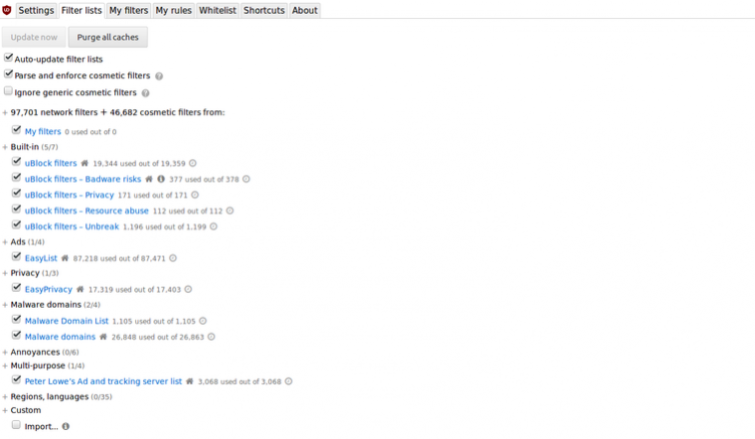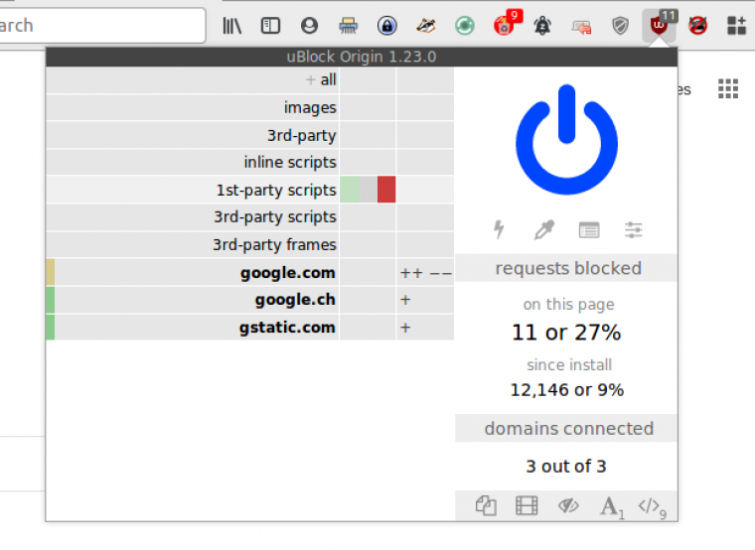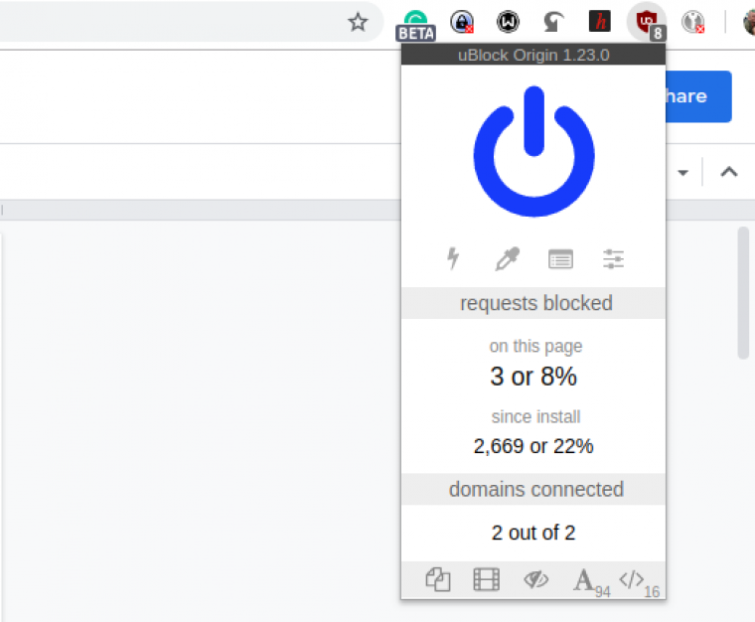Pricing
uBlock Origin is 100% free and open-source software, meaning any developer can do what they like with the code without paying a fee. Interestingly, the project actively refuses donations.
uBlock Origin is a fork of uBlock, but both have the same original founder. Developer Raymond Hill “self-forked” uBlock Origin after transferring the original uBlock project to a different developer in 2015, after which time the two projects have been completely separate.
We cannot emphasize enough that uBlock Origin should not be confused with uBlock, the latter of which is now owned by Adblock Plus and participates in its "Acceptable Ads" scheme.
uBlock Origin shares the same codebase as uMatrix, which performs a similar job, but which is aimed at more advanced users. It uses community-based blocklists to filter out unwanted traffic, and users are free to add new blocklists as they please.
Features
uBlock Origin is stuffed to the gills with more features than we can realistically cover in this review. Highlights include:
- 100% free and open-source (won’t even take donations!)
- Uses community-developed blocklists and can custom lists
- Cross-platform
- Lightweight
- No “acceptable ads”
- Dynamic filtering
- Element zapper
- Element inspector
- One-click element filtering
- Site-specific pop-up blocking
- WebRTC blocking (uBO-Extra is required to block WebRTC connections in Chromium).
- Link prefetching blocking
Blocklists
Over the years, uBlock Origin’s list of features has grown. But at heart is not a complex program. It simply blocks domains known to belong to advertising and malware sources based on community-developed blocklists.

By default the following filter lists are used:
EasyList
Peter Lowe’s Ad server list
EasyPrivacy
Malware domains
The following lists are also available through the Options console:
Fanboy’s Enhanced Tracking List
Dan Pollock’s hosts file
hpHosts’s Ad and tracking servers
MVPS HOSTS
Spam404
And many others
It is also possible to import custom lists from hosts files and to whitelist domains as you see best.
Cross-platform
uBlock Origin is a browser add-on for Firefox, Chrome (including Chromium and Opera), and Edge.
It was available for Safari but has sadly been borked in Safari 13 Catalina by Apple’s dumping support for legacy safariextz-style extensions. It still works in Safari 12, though.
uBlock Origin works in the Android versions of Firefox and Chrome, although Apple’s restrictive developer guidelines prevent the iOS/iPadOS versions of these browsers from supporting any browser add-ons (including uBO).
Google recently rejected uBlock Origin from the Chrome Web Store, but following an angry backlash from fans and developers alike, who accused Google of abusing its dominant market position to shut out rival developers, Google caved in and reinstated uBlock Origin in the Chrome Web Store.
Lightweight
uBlock Origin is an efficient adblocker with a small memory footprint and low CPU overhead. An interesting comparison with AdBlock Plus is available here.
The more filters you use will cause uBlock Origin's memory consumption to increase, although the developers claim that this still remains low compared with most popular adblockers out there. We haven’t tested this ourselves, but what is certain is that its footprint is likely to be negligible on any modern machine.
Dynamic filtering
Only available to Advanced users (enable in the Settings tab of the Dashboard), dynamic filtering allows you to tinker on-the-fly with which scripts and domains you allow a web page to load.

It’s mostly useful for fixing pages that uBlock Origin has otherwise broken. Anyone familiar with uMatrix (on which uBlock Origin is built) should feel right at home here.
Element Zapper
If there is any element on a page you don’t like, you can just zap it at the click of a button!
Element inspector
You can also click on an element to inspect its properties. This includes network filters, cosmetic filters, and DOM storage.

Element blockers
Alternatively, the uBO console allows one-click blocking of pop-ups, large media elements, remote fonts, and JavaScripts.

If you prefer, you can block these elements by default and then allow them on a site-by-site basis.
WebRTC blocking
Of particular interest to VPN users is the WebRTC block feature. WebRTC can expose your real IP address to websites you visit, even if you are using a VPN. In Firefox you can disable it manually, but this setting makes life easy. It is not possible to disable WebRTC in Chrome manually, making this feature particularly welcome to Chrome users.
Just go to the uBO Dashboard -> Settings tab -> Privacy. One thing to be aware of, though, is that this extension will not prevent WebRTC leaks when using a Chrome "VPN” extension.
Link prefetching blocking
Most modern browsers try to speed up browsing by preloading links on a page while you are busy reading that page. Unless you are using a VPN to hide your IP address from these prefetched pages, however, this presents a privacy risk. Fortunately, it's an issue that uBlock Origin can fix.
Privacy and security
uBO is free and open-source software, so jurisdiction is not really an issue. Blocking is performed locally, so no data is uploaded or handled by a third-party. You can enable automatic backup and syncing of your settings using your browser’s sync features, but this must be enabled manually.
Although primarily a simple adblocker, uBlock Origin’s script-blocking features improve your security by preventing malicious and insecure scripts from running. And its default blockists include many tracking domains in addition to ad domains, thus improving your privacy as you browse the web.
Support
As expected, no one-to-one support is available given that the software is an open-source project conducted by a single developer. The uBO Github page, however, contains extensive documentation on all uBlock Origins features. The presentation of this might be a little dense for less technical readers, but the information is all there and in quite some detail.
Ease of use
uBlock Origin is installed as a regular browser extension via the Chrome Web Store, Opera add-ons, or FireFox add-ons websites. The Edge app available is from the Microsoft Store. As already noted, uBO is not available for Safari 13+, but if you are running a legacy version of Safari then you can download it from here.
As we have seen, uBlock Origin is a very sophisticated and customizable piece of software that allows you a huge amount of control over what web pages can and cannot load. Fortunately, such advanced tinkering is entirely optional!
The majority of users simply need to do is install the add-on and then forget about it. Maybe just occasionally glancing up to notice (and be amazed at) how many unnecessary web page requests it is blocking...

That’s an awful lot of requests being blocked when using Google Docs!
In our experience uBlock Origin does not break many pages when using its default settings, but it does happen occasionally.
If page you visit regularly happens to break, it may be worth playing around with the element pickers in order to eliminate the problem while allowing uBO to run. But the lazy and easy solution is to just disable uBO for that website by simply clicking the big blue Off button.

So, using uBlock Origin is basically as easy as you want it to be!
Final thoughts
uBlock Plus is a superb adblocker. It is easy for the layperson to use, but has a huge amount of depth for those wishing greater control over their web browsing experience. It's also free and open-source, so we can see no reason to choose more commercially-oriented products over it (we’re looking at you, Adblock Plus).
Although it does help block website tracking, a common piece of advice that we endorse is to run uBlock Origin alongside the EFF’s Privacy Badger. The two add-ons use very different techniques to prevent tracking, and therefore complement each other well.
0 User Reviews
Leave a Review
Thanks for your review!
0 Comments
Write Your Own Comment
Your comment has been sent to the queue. It will appear shortly.

There are no comments yet.